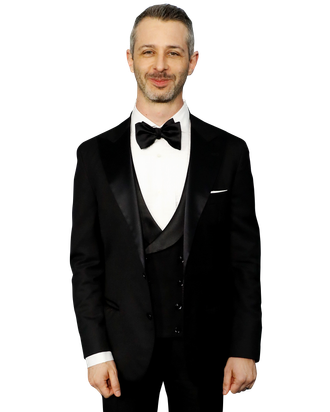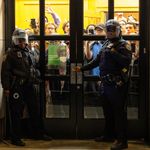
Jeremy Strong made it out of Molly’s Game with one of Aaron Sorkin’s all-time best one-liners: “Ugly dress, ugly shoes,” he mumbled to a J.C. Penney–wearing Jessica Chastain. Three years after his directorial debut, Sorkin called on Strong again for his second writing-directing job. It would be a return to his bread and butter: a classic courtroom drama. The Trial of the Chicago 7, out today on Netflix, is a dramatization of proceedings against a group of anti-Vietnam protestors who demonstrated at the 1968 Democratic National Convention in Chicago. Strong plays Jerry Rubin, the counterculture activist who, alongside Abbie Hoffman (Sacha Baron Cohen), co-founded the Youth International Party. (In Succession’s second season, Jeremy Strong looked very Jeremy Weak; for Chicago 7, he opts for Jeremy Stoned.)
The movie has Sorkin’s regular rosy sentimentality, but the narrative is an emphatic history lesson. For Strong, it was all about the Rubin character and telling the story of that moment. “I felt like I would play a bailiff just to get to be part of telling this story,“ he says over the phone. “Aaron is both a virtuosic writer and one of the greatest screenwriters in the history of cinema. For an actor, his language is like playing one of the great symphonies in the first chair.” Strong talked to Vulture about channeling Rubin’s pranks on set, shooting days and days of courtroom scenes, and how it will feel to return to his day job — playing Kendall Roy on Succession.
Aaron Sorkin wrote the script for The Trial of the Chicago 7 over a decade ago. When did you learn about it?
Maybe eight years ago, actually. I remember just being struck by [reading the script] at that time in my life. Then, fast forward a bunch of years, and I got to work with Aaron on his first film, Molly’s Game. And then he came to me and asked me to play Jerry Rubin. It’s set in a period in time that I’d already been immersed in as an actor because I had worked on Selma and I had worked on Kathryn Bigelow’s film Detroit about the ’67 Detroit riots. It’s a period in our history that I care a great deal about. Jerry is a real feast of a character. He was a fiery, I would say, almost militant radical, and also a merry prankster. He and Abbie [Hoffman, played by Sacha Baron Cohen] and the Yippie party were all about using guerrilla theater and humor.
Do you prepare differently when you’re playing a real person?
I don’t have a set way of working. I think it all kind of reveals itself to you, and you follow your intuition blindly. But certainly when you’re playing a real person — and I’ve played a few real people for whom there’s source material available — you visit that source material like an oracle. You try to really internalize it and spend a lot of time reading everything you possibly can — watching every video, listening to audio recordings. You hope, by some process of osmosis, that some essence of it gets into your bloodstream, and then you’re not doing an impersonation. You’re not trying to imitate them; you’re trying to, I think, at least find where their essence lives in you and then release that. I don’t know if it’s this my own capacity for self-delusion, but I tend to really believe that happens.
What can you tell me about getting Rubin’s voice down?
That takes a lot of technical work. It’s a lot of time. For me, it’s a very long process of listening for a very, very, very long time before you would dare to make a sound yourself. I think it has to be inside of you. It needs to become your voice. I’ve said this before, but I think about it a lot, and it’s a bit of a dictum for me: There’s a line in Hamlet where Shakespeare writes, “For use can almost change the stamp of nature.” And I think, for me, if I have any method at all, it’s that. With enough use, with enough practice, with enough habituation, you can change, almost, the stamp of your own nature.
And with Jerry, it was a lot of things. It was also his appearance, and the clothing, and the music, and the dope, and the noisemakers. I brought a fart machine to set to fuck with people — just anything that you can imagine that they would’ve done in their trickster way.
What did you pull with the fart machine?
I wanted to have a whole bag of tricks — not in any way that was prescribed, but, you know, we’re in this courtroom for a long time. We’re in the courtroom for many, many, many months. It was a long trial, and trials are boring, and [the defendants] found ways to amuse themselves. And this, for me, was one of the ways I found to amuse myself — and to also get under the skin of Judge Hoffman [played by Frank Langella], who to Jerry and Abbie and Bobby [Seale, played by Yahya Abdul-Mateen II] and the rest of the men represented everything that was despicable and odious and bigoted and authoritarian in American government.
So I planted a fart machine in the judge’s dais where he couldn’t find it. I would set it off sometimes before a close-up, and it would really piss him off. His face turned red. Those are the takes we used in the film. It was great — there was real, palpable tension in the room when that happened. I got in trouble sometimes with Aaron and the producers, but I kind of felt like … if I’m Jerry Rubin, and I’m not in contempt of some court, then I’m not doing my job.
What does that look like — getting in trouble with Aaron?
Aaron is a very diplomatic person. Aaron needs to make sure that he gets what he wants. He’d give me a pretty wide berth to do, in Aaron’s mind, whatever the hell it is that I’m doing. Sometimes he would send the producer to give me a dressing down. But, listen, I loved everyone that I worked with and everything that I was doing. And everything we were doing was to serve the material and to bring it to life. Aaron has such a classical, precise structure. He’s so precise that, when you’re trying to inhabit someone who was messy and chaotic and anarchic, I think you have to find a way to bring some jazz or even some kind of punk rock to that strict classical structure and set it on fire a little bit. That was the healthy creative kind of tension on the set for me.
Those courtroom scenes were such ensemble pieces, similar to the big dinner scenes in Succession where the camera is on everyone all the time. Do you feel sort of used to that dynamic now, or maybe particularly skilled at it?
Well, it’s less of a skill than it is a discipline that I seem to have to learn as an actor. Like when you’re on stage, Stanislavski called it the “unbroken line of life.” Everyone’s on stage at the same time. There’s not a camera on anyone, but you’re living moment to moment. You’re trying to live the moment-to-moment truth of whatever is happening for those three hours. And I guess it’s the same thing in the courtroom. Regardless of whether there’s a camera on you or not, you are working. The hard thing about working that way, I find, is that often the most authentic moments and discoveries are made when there’s not a camera on you, when the camera happens to be on the other side of the room or looking at the crowd. And, for me, there’s just no way to control that. Things happen when they happen. And so the challenge is to capture that all on camera.
In that sense, it did feel like we were doing a play because we would have to do these very long scenes so many times. And they would have to be new each time and written in water each time. But it was thrilling just to be part of that group of actors, the caliber of the actors — it was like the 1984 Olympic dream team. And the story that we’re telling is so much bigger than any of us. Everyone checked their Oscars at the door, and they were there to serve the story.
How did it feel to film those protest scenes on location in Chicago?
Marching down Michigan Avenue, we’re chanting “no justice, no peace.” We’re chanting “ the people united will never be defeated.” And this was last October, you know, before we all found ourselves chanting those same things on streets, all over the country. Already it felt very powerful. You want to feel worthy of walking in those people’s shoes. And, of course, those people — Jerry Rubin and Abbie Hoffman and Bobby Seale, you know, all of them — right now, they would be on the street in Louisville, demanding justice. And they would be in Portland, and they would be in Kenosha; they’d be on the front lines everywhere. So I think that we all felt the importance and the gravity of the story we were telling, and that was always underneath it. It permeated the whole experience for me, certainly.
Where do you feel like you fall on the movie’s spectrum of activism? It does present this dichotomy of the more pragmatic Tom Hayden versus the guerilla theater of the Yippies.
I sort of hesitate to weigh in on these things, because I don’t consider myself in any way an authority on all of that. But I’m sure that Tom Hayden’s argument has something to it — in terms of it being about passing legislation. I can see his point. I can also see, and this is what Aaron does so well by allowing you to enter into all sides, that Abbie Hoffman and Jerry were sort of pioneers. Dr. King, too, understood the use of media and “eventizing” protest so that it would get headlines so that you could get attention — not in a manipulative or calculating way, but in a very savvy and effective way.
Abbie Hoffman and Jerry Rubin were also part of the counterculture in a way, I would say, that Hayden wasn’t. Jerry and Abbie went up to a farm outside of Chicago, and they got a pig, and they tried to enter the pig into the presidential election in 1968. And the candidate’s name was Pegasus. They announced the pig’s candidacy because they thought he’d be better than Humphrey and Nixon, and then they were arrested. And, you know, I’m not sure really what that achieved, but they certainly had a gas doing it.
Succession is supposed to start filming by the end of this year. How do you think it will feel to be reunited with everyone?
I mean, I think that is the plan. I think we’re going to go back to work soon. There’s been such a break in all of our lives. I’m looking forward to going back to work, and I’m also a bit … The good thing about what I do, and I’m sure about what you do as a journalist, is that you kinda just start from zero every time you start. You just start over every time. So it feels like a new beginning rather than a continuation of something. I think I have to treat it that way because everything is different. The world is different; I’m different. And, of course, there is a through line of the story, and we will pick it up. But I also think it’s undeniable that we exist in a different world now. I don’t know yet how that will have an impact on me or on the work. Certainly, it’ll be good to see everyone again. I feel like it’s a bit “knives out” for Kendall. It’s going to depend on whose [knives are out] for me to be able to say that it’ll be good to see them.





